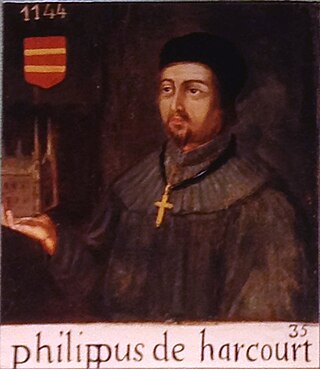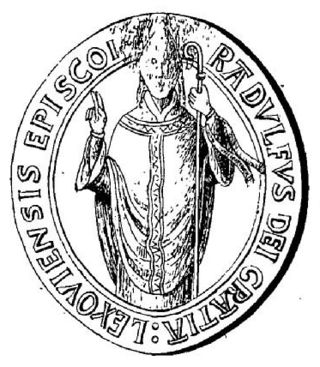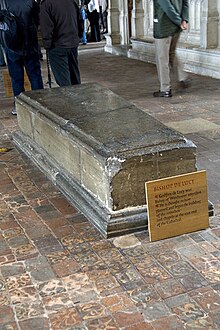Aymer de Valence was a Bishop of Winchester around 1250.

Philip de Harcourt was a medieval Lord Chancellor of England and Bishop of Bayeux. He was unsuccessfully elected as the Bishop of Salisbury.
Geoffrey Ridel was the nineteenth Lord Chancellor of England, from 1162 to 1173.

Ralph de Warneville was the twentieth Lord Chancellor of England as well as later Bishop of Lisieux in Normandy.
Geoffrey was an illegitimate son of King Henry II of England who became bishop-elect of Lincoln and archbishop of York. The identity of his mother is uncertain, but she may have been named Ykenai. Geoffrey held several minor clerical offices before becoming Bishop of Lincoln in 1173, though he was not ordained as a priest until 1189. In 1173–1174, he led a campaign in northern England to help put down a rebellion by his legitimate half-brothers; this campaign led to the capture of William, King of Scots. By 1182, Pope Lucius III had ordered that Geoffrey either resign Lincoln or be consecrated as bishop; he chose to resign and became chancellor instead. He was the only one of Henry II's sons present at the king's death.

William de Longchamp was a medieval Lord Chancellor, Chief Justiciar, and Bishop of Ely in England. Born to a humble family in Normandy, he owed his advancement to royal favour. Although contemporary writers accused Longchamp's father of being the son of a peasant, he held land as a knight. Longchamp first served Henry II's illegitimate son Geoffrey, but quickly transferred to the service of Richard I, Henry's heir. When Richard became king in 1189, Longchamp paid £3,000 for the office of Chancellor, and was soon named to the see, or bishopric, of Ely and appointed legate by the pope.

Godfrey Giffard was Chancellor of the Exchequer of England, Lord Chancellor of England and Bishop of Worcester.

Peter des Roches was bishop of Winchester in the reigns of King John of England and his son Henry III. He was not an Englishman, but rather a native of the Touraine, in north-central France.
Nicholas of Ely was Lord Chancellor of England, Bishop of Worcester, Bishop of Winchester, and Lord High Treasurer in the 13th century.

Walter de Coutances was a medieval Anglo-Norman bishop of Lincoln and archbishop of Rouen. He began his royal service in the government of Henry II, serving as a vice-chancellor. He also accumulated a number of ecclesiastical offices, becoming successively canon of Rouen Cathedral, treasurer of Rouen, and archdeacon of Oxford. King Henry sent him on a number of diplomatic missions and finally rewarded him with the bishopric of Lincoln in 1183. He did not remain there long, for he was translated to Rouen in late 1184.
Richard de Luci or Lucy was first noted as High Sheriff of Essex, after which he was made Chief Justiciar of England.
Richard of Ilchester was a medieval English statesman and prelate.

Josceline de Bohon or Bohun was an Anglo-Norman religious leader.
Richard FitzNeal was a churchman and bureaucrat in the service of Henry II of England.
Herbert Poore or Poor (died 1217) was a medieval English clergyman who held the post of Bishop of Salisbury during the reigns of Richard I and John.
Waleran was a medieval Bishop of Rochester.
John Gervais was a medieval Bishop of Winchester.
Richard de la More was a medieval clergyman who was Bishop-elect of Winchester from 1280 to 1282.
Burchard du Puiset was a medieval Anglo-Norman clergyman and treasurer of the diocese of York. Either the nephew or son of Hugh du Puiset, the Bishop of Durham, Burchard held a number of offices in the dioceses of York and Durham before being appointed treasurer by King Richard I of England in 1189. His appointment was opposed by the newly appointed Archbishop Geoffrey, which led to a long dispute between Geoffrey and Burchard that was not resolved until the mid 1190s. After the death of Hugh du Puiset, Burchard was a candidate for the Hugh's old bishopric, but lost out in the end to another candidate. Burchard died in 1196.








